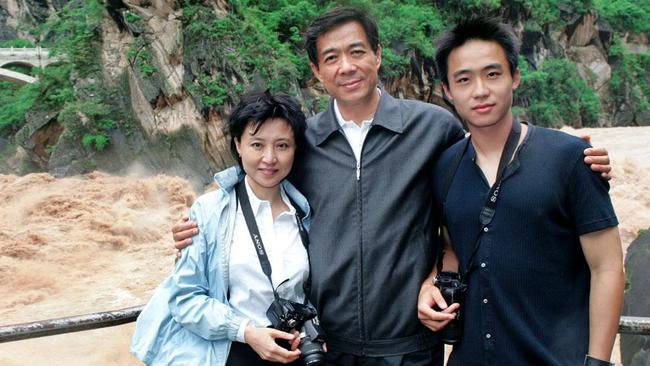China’s ‘little emperor’ takes Taiwanese bride
Love and marriage have forced the son of a disgraced Communist Party official to resurface.

He was once the red princelings’ princeling, the son and grandson of celebrated Communist Party leaders whose party lifestyle at Harrow, Oxford and Harvard made the front pages.
Then the scandalous fall from power of his father, Bo Xilai, chief rival to President Xi Jinping, forced Bo Guagua into a life of anonymity and, apparently, quiet industry.
For a decade the younger Bo has maintained a low profile as a lawyer in Canada while trying to survive the ensuing maelstrom of publicity mixed with China’s sometimes vindictive politics.
But love and marriage have forced Bo, now 36, to resurface.
Amid tight security, it was confirmed that his wedding to Hsu Hui-yu, the daughter of a prominent Taiwanese business family he met at university, took place amid tight security on the island on Saturday.
The wedding was revealed after Bo Guagua, whose distinctively boyish good looks helped his rise to prominence as a student, was spotted arriving at the island’s main airport.
The ceremony was held strictly behind closed doors, with roads leading to the resort venue in the northwestern city of Hsinchu blocked from journalists and curious onlookers by police cars and private security.
All visits to Taiwan by citizens of mainland China need to be approved by the island’s Mainland Affairs Council, and Bo’s permit was confirmed with a brief statement. There was little doubt that it received more attention than most, with his family’s leading role in a government dedicated to taking Taiwan under its rule, by force if necessary.
Bo’s grandfather, Bo Yibo, was one of China’s most celebrated early revolutionaries, a comrade of Chairman Mao Zedong who was purged in the Cultural Revolution. He later returned to power as one of the so-called Eight Immortals, veteran advisers to Mao’s successor as paramount leader, Deng Xiaoping, before dying at the age of 98 in 2007.
By that time, his son, Bo Xilai, was one of several sons of the revolutionary founders of the People’s Republic vying for power in the “New China”, joining the Politburo that year at the same time as Xi, though in a more junior role.
For the next five years, he became one of the Chinese leadership’s most outspoken figures, clearly hoping that his background, prominence and international ties as a former commerce minister would promote him into a top job when president Hu Jintao retired in 2012.
Instead, he was purged. Not long after, his wife, Gu Kailai, was arrested as a result of a police investigation into the death of English businessman Neil Heywood, whose body had been found in a hotel room just before. He had been poisoned.
Heywood had been a friend of the Bo family, having arranged for Bo Guagua to attend his old school, Harrow, as well as acting as a middleman for the family’s reportedly extensive overseas business interests. Gu pleaded guilty, without ever making her motive clear, but Bo, arrested and charged with corruption, denied everything, without success. Both were jailed for life.
There was no doubt that part of the animosity against the pair was driven by the publicity their son was enjoying first at Oxford, where he studied as an undergraduate, and then at Harvard and Columbia University in the US where he took further degrees.
He was regularly seen at student parties – not necessarily wild by Western standards, but certainly more sybaritic than the spartan entertainments on offer in most Chinese universities. They played into widespread Chinese concerns that the new generation of leaders’ children were spoilt “little emperors”.
Bo stayed abroad during his parents’ trial, though rumours that he had taken British citizenship were denied. He did, however, give statements to Chinese and Western newspapers asking that his father be given a fair trial, but refused to comment on leaked trial documents implying that his father had denounced his own lifestyle in interviews.
His bride is from a far less newsworthy family. Hsu Hui-yu’s family own a large private hospital on the island. The family do, however, have close historic ties to the Kuomintang, the nationalist political party displaced from China in 1949 by the communists in the civil war that then established dominance over Taiwan.
That the marriage was one of politics as well as of two young university classmates did not go unobserved on either side of the Taiwan Strait. “This is the true embodiment of cross-straits ties,” one commentator said.
The Times



To join the conversation, please log in. Don't have an account? Register
Join the conversation, you are commenting as Logout